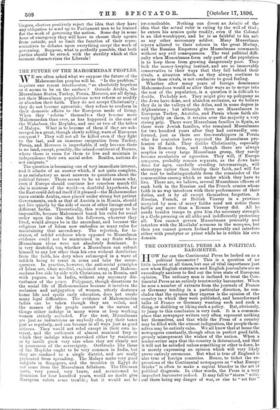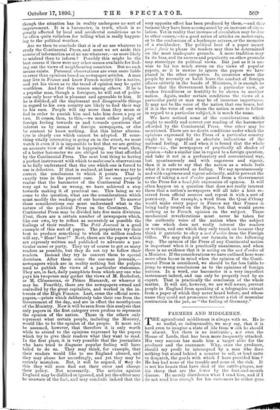THE CONTINENTAL PRESS AS A POLITICAL BAROMETER. -H OW far can
the Continental Press be looked on as a political barometer ? This is a question of no little interest at all times, but one of vital importance just now when English statesmen and English journalists are so exceedingly anxious to find out the true state of European opinion. The ordinary man is inclined to treat the Con- tinental Press as an entirely trustworthy barometer. When he sees a number of extracts from the journals of France or Germany tending in a particular direction, he con- cludes that the opinion they express is the opinion of the country in which they were published, and henceforward talks of France or Germany wanting such and such a thing, or disliking or liking such a policy. But, obviously, to jump to this conclusion is very rash. It is a common- place that newspaper writers very often represent nothing but themselves, and that while the Press of a country may be filled with the utmost indignation, the people them- selves may be entirely calm. We all know that at home the newspapers constantly, though often in perfect good faith, grossly misrepresent the wishes of the nation. When a leader-writer says that the country is determined, and that it will not be satisfied unless something or other is done, he is merely expressing an opinion which will very likely prove entirely erroneous. But what is true of England is also true of foreign countries. Bence, to ticket the ex- pressions of the Continental newspapers as "what Europe thinks" is often to make a capital blunder in the art of political diagnosis. In other words, the Press is a very imperfect barometer indeed. It may fall to " storm " with- out there being any danger of war, or rise to "set fair" though the situation has in reality undergone no sort of improvement. It is a barometer, in truth, which is so greatly affected by local and accidental conditions as to be often quite valueless for telling what is really happen- ing to the political weather.
Are we then to conclude that it is of no use whatever to study the Continental Press, and must we set aside this source of information as of no use whatever,—as more likely to mislead than to inform ? Possibly this might be the best course if there were any other means available for find- ing out the views of neighbouring countries. But no such means exists. Personal observations are even more liable to error than opinions based on newspaper articles. A man may live in France and know French society like a native, and yet his views as to the trend of opinion may be quite worthless. And for this reason among others. If be is a popular man, though a foreigner, be will out of polite- ness only hear what is pleasant and agreeable to him. If he is disliked, all the unpleasant and disagreeable things in regard to his own country are likely to find their way to his ears. People will say more than they mean or feel in order to punish him and take him down a peg or two. It comes, then, to this,—we must either judge of foreign feeling towards us and towards questions that interest us by means of foreign newspapers, or else be content to know nothing. But this latter alterna- tive is clearly one which cannot be adopted. If some- thing vitally interesting is going on in the street, we must watch it even if it is impossible to feel that we are getting an accurate view of what is happening. For want, then, of a better barometer we are obliged to use that afforded by the Continental Press. The next best thing to having a perfect instrument with which to make one's observations is to fully understand that the one which one is forced to use is defective. If that is realised, at least we may try to correct the conclusions to which it points. That is exactly true in the present case. If we once properly realise that the barometer of the Continental Press is very apt to lead us wrong, we have achieved a step towards making it of practical use. This being so we come to the question, what are the considerations which must modify the readings of our barometer ? To answer these considerations one must understand what is the nature of the political Press on the Continent. The Continental Press may be divided into five main divisions. First, there are a certain number of newspapers which, like our own, try to reflect as accurately as possible the feelings of their readers. The Petit Journal is a good example of this sort of paper. The proprietors try their best to produce something to which its million readers will say, "Hear! hear!" Next, there are the papers which are expressly written and published to advocate a par- ticular cause or party. They try of course to get as many readers as possible, but they do not try to follow their readers. Instead they try to convert them to special doctrines. After these come the one-man journals,— newspapers which are in reality nothing but the pulpits used to publish the views of a particular statesman. They are, in fact, daily pamphlets from which any one who pays his twopence may gather the views of M. Rochefort, or M. Clemenceau, or Prince Bismarck, or whoever it may be. Fourthly, there are the newspapers owned and controlled by the great capitalists, and worked in the in- terests of the High Finance. Last, come the official news- papers,—prints which deliberately take their cue from the Government of the day, and are in effect the mouthpieces of the Ministry. Now it will be seen from this analysis that only papers in the first category even profess to represent the opinion of the nation. Those in the others only represent what certain people, including the Ministry, would like to be the opinion of the people. It must not be assumed, however, that therefore it is only worth while to attend to the opinions expressed by the papers which try to give their readers what they want to read. In the first place, it is very possible that the journalists who have tried to diagnose popular feeling will have failed to do so. They may think, for example, that their readers would like to see England abused, and they may abuse her accordingly, and yet they may be entirely mistaken. But, it will be argued, if they do this they will soon find out their error and change their policy. Not necessarily. The articles against England may be disliked or ignored, and yet the editor may be unaware of the fact, and may conclude indeed that the very opposite effect has been produced by them,—and thi7 because they have been accompanied by an increase of circu- lation. Yet in reality that increase of circulation may be duo to other causes,—to a good series of articles on motor-cars, or to the confessions of a burlesque actress, or the memoirs of a stockbroker. The political bent of a paper meant prima facie to please its readers may thus be determined on the most inadequate grounds. A mere tradition may fix its bias, and its success and popularity on other grounds. may stereotype its political views. But just as it is un- wise to lay too much stress on the views of popular papers, so it is unwise to ignore the papers we have- placed in the other categories. In countries where the- people by necessity or habit leave the conduct of foreign affairs entirely in the hands of Ministers, it is enough to know that the Government holds a. particular view, or wishes friendliness or hostility to be shown to another nation. Again, under certain conditions the views of a particular party or man may be of immense importance. It may not be the voice of the nation that one hears, but if it is the voice of one whom the nation is sure to follow- in regard to a particular subject, it is much the same.
We have noticed some of the considerations which ought to modify and correct our reading of the barometer afforded by the Continental Press. One other may be mentioned. There are no doubt conditions under which the opinions expressed by the Press of a particular country ought to be regarded as absolute indications of the national feeling. If and when it is found that the whole Press—i.e., the newspapers of practically all shades of opinion—take a similar line in regard to a foreign question, and take it not in a perfunctory and conventional way,. but spontaneously and with eagerness and vigour,. then it is safe to say that the nation as a whole feels. what it is represented as feeling. We say spontaneously- and with eagerness and vigour advisedly, and to prevent the error of taking a mot d'ordre passed from a Government to the Press for a bona-fide expression of opinion. It will often happen on a question that does not really interest them that a nation's newspapers will all take a hint re- ceived from official sources and repeat it with a sort of parrot-cry. For example, a word from the Quai d'Orsay would make every paper in France say that France is. being badly treated on the Niger, but that would prove nothing as to French opinion on the subject. These- mechanical reverberations must never be taken for- the authentic voice of the nation when the subject is one which does not really interest the readers or writers, and one which they only touch on because they think it patriotic to obey a mot d'ordre from the Foreign Office. We may then put our formula in the following way. The opinion of the Press of any Continental nation. is important when it is practically unanimous, and when there is no evidence that it is acting on the mot d'ordre of a Minister. If the considerations we have outlined hero were-- more often borne in mind when the opinion of the Conti- nental Press is considered, we should be far less liable to- jump to wrong conclusions as to the opinions of foreign nations. In a word, our barometer is a very imperfect instrument indeed, and can only be properly read by an expert. That is practically the conclusion of the whole• matter. It will not, however, we are well aware, prevent- people in England from speaking of a telegraphic extract. from a paper of which they never heard before, and whose name they could not pronounce without a risk of muscular contraction in the jaw, as "the feeling of Germany."







































 Previous page
Previous page